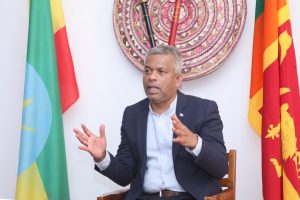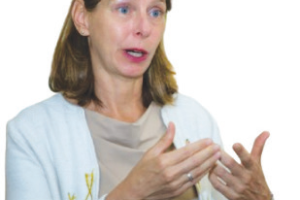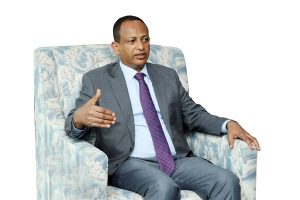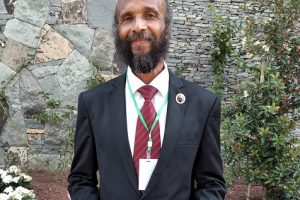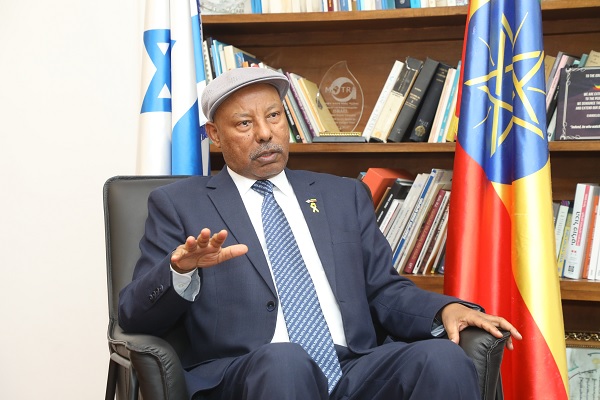
Ambassador Extraordinary and Plenipotentiary Dr. Avraham Neguise has been serving as Israel’s Ambassador to Ethiopia since August 2024, focusing on strengthening bilateral relations and enhancing Israel’s ties with the African Union. His extensive background includes roles in politics, advocacy, social work, and education.
Previously, he was a Special Advisor to the Prime Minister of Israel on Ethiopian-Israeli affairs and served as a Member of Knesset from 2015 to 2019, where he chaired the Committee on Immigration, Absorption, and Diaspora Affairs. Dr. Avraham led initiatives to foster Israel-Ethiopia relations, accompanying high-level officials on official visits and leading parliamentary delegations.
Ambassador Dr. Avraham holds multiple degrees, including a PhD in Education from the University of Sussex and an LLB from Sha’arei Mishpat Academic Center. He is fluent in Hebrew, English, and Amharic.
In an exclusive interview with The Ethiopian Herald, Dr. Avraham, discussed the multifaceted support Israel provides to Ethiopia, including advancements in agriculture, digital transformation, and collaborative university research. He highlighted his personal connection to Ethiopia and his commitment to transferring Israeli knowledge and technologies to foster Ethiopian development.
Ambassador Avraham also stressed the importance of enhancing cooperation between the two nations in combating terrorism and promoting sustainable development, expressing Israel’s willingness to share its extensive experience in areas ranging from counter-terrorism strategies to environmental innovation. Explore his in-depth insights.
Recently, Israel’s Foreign Minister Gideon Sa’ar visited Ethiopia. Could you tell us about the significance of this visit?
This visit was both fruitful and symbolic. The Foreign Minister was accompanied by a delegation of over 30 Israeli companies. We organized intensive business-to-business (B2B) meetings with Ethiopian companies and investors. These sessions were productive, and I believe many Israeli investors gained valuable insight into Ethiopia’s potential, particularly in sectors like solar energy and water management.
Some Israeli companies are already active here—building solar energy facilities and supporting irrigation by harnessing river and lake water. Our goal is to further expand and empower such initiatives.
Ethiopia and Israel both face persistent threats from terrorism. How can the two nations enhance collaboration in counter-terrorism?
Terrorism is a global threat. It is the enemy of peace, development, prosperity, and civilization. That’s why all peace-loving, development-focused, and civilized nations must stand together in the fight against it. Every country, including those in our region, faces this challenge.
In the Horn of Africa, terrorist groups like Al- Shabaab and Al-Qaeda, as well as other radical factions, not only destabilize regional peace but also threaten global trade, particularly through strategic maritime corridors like the Red Sea. These disruptions are deeply felt across the international economy.
To tackle this challenge effectively, countries must share intelligence, strategies, and best practices. Joint efforts are essential.
Given Ethiopia’s strategic position in East Africa and Israel’s strong security interest in the Red Sea region, there’s significant potential for partnership. Our countries already share a strong historical, diplomatic, and economic bond. Strengthening our security cooperation is the next logical and necessary step—because without security, sustainable development is extremely difficult.
Since its founding in 1948, Israel has continuously faced terrorism. Through decades of experience, we’ve built substantial knowledge, strategies, and technologies to confront it. If Ethiopia is willing, Israel is ready to share this expertise, whether it’s in intelligence gathering, cyber security, field operations, or strategic planning.
Could Ethiopia benefit from Israel’s broader experience beyond security, especially in areas like environmental protection and water management—such as through the Green Legacy Initiative?
Absolutely. Israel has deep expertise in environmental innovation, particularly in desert greening, water conservation, and reforestation. Take the Jewish National Fund, for example—an organization that predates the founding of the Israeli state and has been planting trees across Israel for decades. We are very proud of this heritage, and we are more than willing to share our experience with Ethiopia’s Green Legacy Initiative, which we admire and support.
This initiative is not only about beautifying landscapes but also about mitigating climate change. Here are some specific ways Israel can contribute:
- Drip Irrigation: Israel pioneered this method, which maximizes crop yield while minimizing water usage—perfect for areas with limited resources.
- Water Recycling: Over 90% of Israel’s wastewater is treated and reused, primarily for agriculture. This technology could benefit Ethiopia significantly.
- Desalination: Israel leads in converting seawater into fresh water for drinking and farming, with several large-scale plants in operation.
- Atmospheric Water Generation: This cutting-edge technology extracts clean drinking water from the air—ideal for use in remote or arid areas, including military posts and communities in need.
These technologies are already transforming life in many parts of Israel, and we are ready to share them with Ethiopia, especially to support reforestation, agriculture, and access to clean water.
So, in essence, Israel is prepared to share both its counter-terrorism experience and its environmental innovations? Yes, exactly. Israel is ready and willing to cooperate, based on Ethiopia’s needs and interests. In security, we have decades of experience that can be valuable to Ethiopia’s efforts. And in environmental development— from tree planting to water management— we have the tools, the knowledge, and the commitment to assist.
Our two countries have a strong and growing relationship. As we deepen our cooperation, we believe this partnership can help bring greater peace, prosperity, and sustainability not only to Ethiopia and Israel—but also to the wider region.
What specific Israeli technologies are being introduced in Ethiopia, and how do you envision their impact on the country’s agricultural productivity and water management?
For example, there is an Israeli technology that produces drinking water directly from the atmosphere. I drank the water myself. the atmosphere. I drank the water myself. It’s clean and safe. I’ll share the name of the company with you—you can look it up online and read more about it. These are just some of the innovations Israel is ready to share.
When I was appointed as an ambassador to Ethiopia, I considered it a historic opportunity. I grew up here, so I understand both the needs and the immense potential of this country—its water resources, fertile land, climate, minerals like gold, potassium, phosphorus, and even petroleum. If we apply Israeli technology—the same technology that transformed deserts into productive land—I firmly believe Ethiopia can become a leading economy in Africa.
Israeli companies have already started this transformation. In Bishoftu, they’re applying drip irrigation systems and advanced agricultural techniques. I visited farms growing avocados, tomatoes, bananas, papayas, and other fruits. Local farmers are learning and applying these methods on their own lands.
There’s also meaningful work being done near Woliso, 120 km away from Addis with Israeli-led agricultural projects underway. It’s just the beginning, but the progress is very encouraging.
With Ethiopia rapidly advancing in digital entrepreneurship, how can Israel—known for its innovation—support the country’s digital transformation?Digital transformation is indeed critical. One of my first initiatives here was to assess Ethiopia’s readiness in this area. I also reviewed the Ethiopian government’s economic reform policy, which includes a clear commitment to digital development.
In response, the Israeli government sent four experts last November to support Ethiopia in innovation and technology. We coordinated with the Ministry of Innovation and Technology and launched a joint Innovation Week here in Addis Ababa.
These experts shared experiences on digital ecosystems, artificial intelligence (AI), and entrepreneurship development. They worked directly with institutions like Addis Ababa University’s Institute of Technology and the National Bank of Ethiopia, which were deeply engaged in these discussions. Our aim was to strengthen the ecosystem for Ethiopian entrepreneurs.
The initiative extended to cooperation with regional bodies like UNECA (United Nations Economic Commission for Africa) and UNDP, where we shared experiences not just for Ethiopia but for broader African development.
We’ve now established a joint follow-up committee—with representatives from our embassy, Israel’s Ministry of Foreign Affairs, and the Ethiopian Ministry of Innovation and Technology. This committee ensures that the collaboration continues and remains results-driven.
I recently visited the Mesob-Digital One-Stop Service Center—a promising sign of Ethiopia’s digital transformation. Do you plan to support such projects further?
The Ministry of Innovation and Technology has its own team as well, and together we are assessing progress and ensuring ongoing support. Earlier this year, Foreign Minister Dr. Gedion Timothewos led a high-level Ethiopian economic delegation to Israel. They met with Israeli innovators and visited start-up ecosystems, infrastructure projects, and research institutions. We’re also working closely with Ethiopia’s Investment Holdings Office to build more economic partnerships, especially in the digital space.
Looking ahead, could we expect Israeli experts to return or new specialists to come and continue this momentum?
Yes, that is our intention. We want to continue sending experts and supporting Ethiopian innovation. Follow-up visits, expert exchanges, and new joint projects are all part of our roadmap.
Israeli research institutions are globally respected. Is there room for increased collaboration with Ethiopian universities?Definitely. There are already joint research projects underway between Israeli and Ethiopian universities—including Addis Ababa University, Gondar University, and Bahir Dar University.
Personally, I’ve participated in initiatives focusing on Ethiopian-Israeli historical and cultural studies, particularly relating to the Ethiopian Jewish community. But we want to expand collaboration across all academic fields—from climate research and innovation to cyber security, legal studies, and social sciences.
Israel has deep experience in scientific research, and Ethiopia has enormous intellectual potential and resources. Strengthening academic partnerships is not just desirable—it’s essential for the development of both our nations.
Israel has made impressive strides in solar and renewable energy. How can Ethiopia and Israel partner to develop community energy infrastructure and innovation across Ethiopia?
Renewable energy and water management are key areas I prioritized upon beginning my mission in Ethiopia. In February, Israel’s Minister of Energy and Infrastructure, H.E. Eric Cohen, visited Ethiopia and signed a bilateral agreement with Ethiopia’s Ministry of Energy and Water; led by Dr. Habtamu Itefa.
The agreement aims to deepen cooperation on renewable energy and water management.Minister Cohen also met with other key ministers, including Dr. Belete Molla from the Ministry of Innovation and Technology, and Dr. Abraham Belay from the Ministry of Irrigation and Lowland. We also engaged with the Ministry of Mines. These partnerships aim to expand collaboration in water, energy, and mining sectors.
Israel’s Ministry of Energy and Infrastructure oversees not only energy and water management, including irrigation, but also mining. The meetings during this visit resulted in multiple Memoranda of Understanding laying the groundwork for sustained cooperation.
Do you have any final message you’d like to convey?
The recent visit by Israeli Foreign Affair Minister which is a high-level visit signifies a strong step forward in Ethiopia–Israel relations—economically, diplomatically, politically, and in terms of security. Our Foreign Minister met with Ethiopia’s Prime Minister, Foreign Minister, and other senior officials. Several agreements were reached, reinforcing our commitment to long-term collaboration.
At the Embassy, we work through four main channels:
- Government-to-Government (G2G): We focus on capacity-building, joint government projects, and knowledge exchange.
- Private Sector Investment: We encourage Israeli investors to engage in Ethiopia by facilitating high-level visits and showcasing opportunities.
- Non-Governmental Organizations (NGOs): Many Israeli NGOs work in health, -agriculture, and humanitarian areas. For example, “Operation Ethiopia” recently provided free eye surgeries for 580 patients and distributed eyeglasses. Others are addressing pediatric care, heart surgeries, and reducing infant mortality through advanced technologies.Organizations like NAALA work in all 12 regions of Ethiopia to combat neglected diseases, promote hygiene, and enhance education, especially in rural areas. Some even assist in agriculture by introducing irrigation techniques and organic fertilization.
- People-to-People Relations: This includes tourism, cultural exchanges, and community ties. Ethiopian-Israelis maintain strong cultural links. Over 180,000 people of Ethiopian origin now live in Israel, keeping Ethiopian traditions alive—from music and food to clothing.
Just recently, during our celebration of Israel’s 77th Independence Day here in Ethiopia, we invited second-generation Ethiopian-Israeli musicians to perform. They also participated in Ethiopia’s jazz festival, reinforcing our shared cultural heritage.
Thank you so much
Thank you
BY WAKUMAN KUDAMA
THE ETHIOPIAN HERALD SATURDAY 17 MAY 2025

